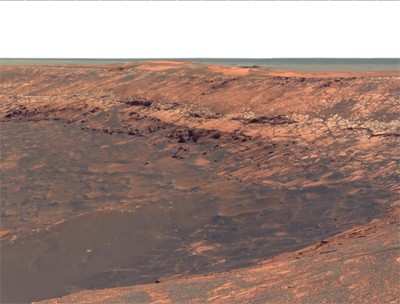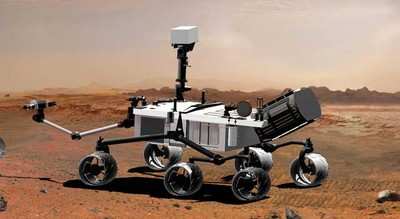Nearly Double The Number Of Expected Submissions Received
NASA's call to scientists and engineers to help plan a new strategy to explore Mars has resulted in almost double the amount of expected submissions with unique and bold ideas. About 400 concepts or abstracts were submitted to the Concepts and Approaches for Mars Exploration Workshop in Houston, which was organized to gather input for the reformulation of NASA's Mars Exploration Program. Submissions came from individuals and teams that included professional researchers, undergraduate and graduate students, NASA centers, federal laboratories, industry, and international partner organizations.

NASA is reformulating the Mars Exploration Program to be responsive to high-priority science goals and President Obama's challenge of sending humans to Mars orbit in the 2030s. "This strong response sends a clear message that exploring Mars is important to future exploration," said John Grunsfeld, associate administrator for NASA's Science Mission Directorate at the agency's headquarters in Washington and an astrophysicist and astronaut. "The challenge now will be to select the best ideas for the next phase."
Selected abstracts will be presented during a workshop June 12-14 hosted by the Lunar and Planetary Institute in Houston. Selectees are now being invited to present and discuss concepts, options, capabilities and innovations to advance Mars exploration. Workshop discussion will help inform a strategy for exploration within available resources beginning as early as 2018, and stretching into the next decade and beyond. Proceedings will be streamed live online.
"Developing abstracts is very time consuming, requiring intense preparation, and we appreciate the fabulous response," said Doug McCuistion, director, NASA's Mars Exploration Program in Washington. "Even though space is limited, to ensure transparency in the process anyone can observe the scientific and engineering deliberations via the Web."

Based on the abstracts selected, associated working groups will consider the ideas and concepts in depth during the workshop. Near-term ideas will be taken into consideration for early mission planning in the 2018-2024 timeframe, while mid- to longer-term ideas will inform program-level architecture planning for 2026 and beyond. The Mars Program Planning Group (MPPG), tasked with developing options for a reformulated Mars Exploration Program, will consider the workshop inputs for the various options, taking into consideration budgetary, programmatic, scientific, and technical constraints.
Options developed by the MPPG are expected to advance the science objectives in the National Research Council's Planetary Science Decadal Survey. The survey rated the return of Mars samples to Earth as a top scientific goal. Developed in consultation with the scientific and technical community, the MPPG report is expected to be delivered for NASA review at the end of the summer. The MPPG reports to Grunsfeld, who chairs the overall, agencywide reformulation strategy along with William Gerstenmaier, associate administrator for NASA's Human Exploration and Operations Mission Directorate, NASA Chief Scientist Waleed Abdalati and NASA Chief Technologist Mason Peck.
"Getting to Mars is hard," said Grunsfeld. "We've had successes and losses, but the human spirit to continue exploring the Red Planet prevails."
This August, NASA will land the Mars Science Laboratory, Curiosity (below), on the planet's surface. This roving science laboratory will assess whether Mars was or is today an environment able to support life. In 2013, NASA will launch the Mars Atmosphere and Volatile Evolution (MAVEN) orbiter, the first mission devoted to understanding the Martian upper atmosphere. (Images provided by NASA)

 Airborne 05.10.24: Icon Auction, Drunk MedEvac Pilot, Bell ALFA
Airborne 05.10.24: Icon Auction, Drunk MedEvac Pilot, Bell ALFA ANN's Daily Aero-Term (05.13.24): ILS PRM Approach
ANN's Daily Aero-Term (05.13.24): ILS PRM Approach ANN's Daily Aero-Linx (05.13.24)
ANN's Daily Aero-Linx (05.13.24) Airborne-NextGen 05.07.24: AI-Piloted F-16, AgEagle, 1st 2 WorldView Sats
Airborne-NextGen 05.07.24: AI-Piloted F-16, AgEagle, 1st 2 WorldView Sats Airborne 05.08.24: Denali Update, Dad-Daughter Gyro, Lake SAIB
Airborne 05.08.24: Denali Update, Dad-Daughter Gyro, Lake SAIB





